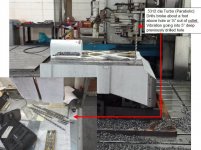PegroProX440
Hot Rolled
- Joined
- Mar 7, 2012
- Location
- Ormond Beach
I picked up quite a few coolant fed carbide drills at an auction but I do not have a coolant through machine. Is there any people using these with flush coolant with success and at what depth. When should I start to peck. Material is tool steel in its soft state and prehard. I also picked up an OSG Helios drill that I cant wait to try for deep waterlines. I will keep you informed on if its all the hype..


 i guess you are talking about a mill
i guess you are talking about a mill